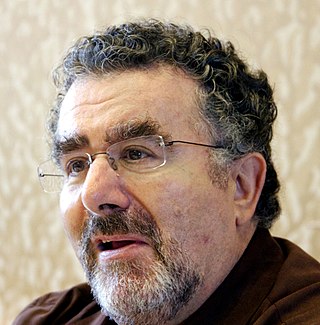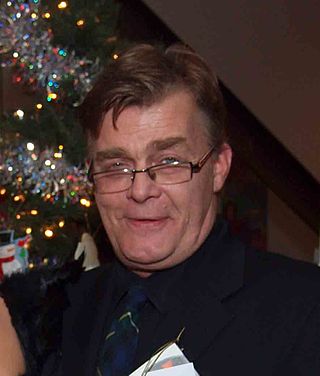Related Research Articles
The Genie Awards were given out annually by the Academy of Canadian Cinema and Television to recognize the best of Canadian cinema from 1980–2012. They succeeded the Canadian Film Awards.

The Gemini Awards were awards given by the Academy of Canadian Cinema & Television between 1986–2011 to recognize the achievements of Canada's English-language television industry. The Gemini Awards are analogous to the Emmy Awards given in the United States and the BAFTA Television Awards in the United Kingdom. First held in 1986 to replace the ACTRA Award, the ceremony celebrated Canadian television productions with awards in 87 categories, along with other special awards such as lifetime achievement awards. The Academy had previously presented the one-off Bijou Awards in 1981, inclusive of some television productions.

Saul Hersh Rubinek is a German-born Canadian actor, director, producer, and playwright.
The Academy of Canadian Cinema & Television is a Canadian non-profit organization created in 1979 to recognize the achievements of the over 4,000 Canadian film industry and television industry professionals, most notably through the Canadian Screen Awards The mandate of the Academy is to honour outstanding achievements; to heighten public awareness of and increase audience attendance of and appreciationпа of Canadian film and television productions; and to provide critically needed, high-quality professional development programs, conferences and publications.

Nicholas Campbell is a Canadian film, television and voice actor and filmmaker, who won three Gemini Awards for acting. He is known for such films as Naked Lunch, Prozac Nation, New Waterford Girl and the television series Da Vinci's Inquest.
Pierre Gill is a Canadian cinematographer and film and television director. A Montreal native, he is closely associated with Quebecois cinema, and has collaborated with directors like Jean-Marc Vallée, Charles Binamé, Christian Duguay, Allan Moyle, and Denis Villeneuve, working on such films as Black List, The Art of War, Lost and Delirious,The Rocket, Polytechnique, and Upside Down. He served as the second unit director of photography on Villeneuve's Blade Runner 2049, which won the Academy Award for Best Cinematography.

Victor Sarin is an Indian-born Canadian/American film director, producer and screenwriter. His work as a cinematographer includes Partition, Margaret's Museum, Whale Music, Nowhere to Hide, Norman's Awesome Experience, and Riel. He also directed such projects as Partition, Left Behind, and Wind at My Back.
Alain Dostie is a Canadian cinematographer, film director and screenwriter. His work includes Silk, The Red Violin and The Confessional. He was nominated for a Genie Award for Best Achievement in Cinematography for his work in Silk.
Guy Dufaux is a French-born Canadian cinematographer. The majority of his works have been in Canadian cinema; he immigrated to Canada in 1965 and became a Canadian citizen in 1971. He is also the father of Montréal-based sculptor Pascal Dufaux and the brother of the late Canadian documentary filmmaker, Georges Dufaux.
Francis Mankiewicz was a Canadian film director, screenwriter and producer. In 1945, his family moved to Montreal, where Francis spent all his childhood. His father was a second cousin to the famous Hollywood brothers, Joseph L. Mankiewicz and Herman J. Mankiewicz.
Moze Mossanen is a Canadian independent writer, director and producer who has created a body of critically acclaimed film and TV work blending drama, music, performance and documentary. Most recently, he wrote and directed the documentary feature, You Are Here: A Come From Away Story. His other works include Year of the Lion, a dance film adaptation of the novel, Dangerous Liaisons, and Nureyev, a docu-drama about the life of the Russian dancer Rudolf Nureyev.
Glen MacPherson, CSC/ASC is a Canadian cinematographer based in Los Angeles. MacPherson's cinematography career dates to the mid-1980s. MacPherson is fluent in English and French.

The Canadian Screen Awards are awards given for artistic and technical merit in the film industry recognizing excellence in Canadian film, English-language television, and digital media productions. Given annually by the Academy of Canadian Cinema & Television, the awards recognize excellence in cinematic achievements, as assessed by the Academy's voting membership.
Maribeth Solomon is a Canadian film and television composer and songwriter. She has been nominated for the Genie Award, the Emmy Award, the Gemini Award and the International Film Music Critics Association Award for her work.
The Canadian Screen Award for Best Cinematography in a Documentary is an annual award, presented as part of the Canadian Screen Awards program to honour the year's best cinematography in a documentary film. It is presented separately from the Canadian Screen Award for Best Cinematography for feature films.
Grahame Woods was a Canadian cinematographer and writer. He is most noted as a cinematographer for his work on the television drama series Wojeck, for which he won the Canadian Film Award for Best Black-and-White Cinematography at the 19th Canadian Film Awards in 1967 for the episode "The Last Man in the World"; as a writer, he is most noted for the television films War Brides (1980) and Glory Enough for All (1988).
Miklós Lente was a Canadian cinematographer and filmmaker. He was most noted for his work on the 1978 film In Praise of Older Women, for which he won the Canadian Film Award for Best Cinematography at the 29th Canadian Film Awards and the Canadian Society of Cinematographers award for Best Cinematography in a Feature.
Éric Cayla is a Canadian cinematographer. He is most noted as a two-time Genie Award nominee for Best Cinematography, receiving nods at the 17th Genie Awards in 1996 for A Cry in the Night and at the 18th Genie Awards in 1997 for Karmina, and a two-time Jutra Award nominee for Best Cinematography, receiving nods at the 2nd Jutra Awards in 2000 for Babel and at the 5th Jutra Awards in 2003 for The Baroness and the Pig.
Marc Champion (1927-2018) was a Canadian cinematographer. He is most noted as a two-time Canadian Film Award/Genie Award nominee for Best Cinematography, receiving nominations at the 29th Canadian Film Awards in 1978 for I, Maureen and at the 7th Genie Awards in 1986 for Samuel Lount, and as a Gemini Award winner for Best Photography in a Dramatic Program or Series at the 3rd Gemini Awards in 1988 for Anne of Green Gables: The Sequel.
Andrew Rai Berzins is a Canadian film and television writer. He is most noted as cowriter with Andrew Wreggitt of the television film Borealis, for which they won the Canadian Screen Award for Best Writing in a Dramatic Program or Miniseries at the 2nd Canadian Screen Awards in 2014.
References
- ↑ Maria Topalovich, And the Genie Goes To...: Celebrating 50 Years of the Canadian Film Awards. Stoddart Publishing, 2000. ISBN 0-7737-3238-1. pp. 117-119.
- ↑ "NFB films get award nomination". Alberni Valley Times , March 19, 1980.
- ↑ Sid Adilman, "Anne leads field in Geminis race". Toronto Star , October 16, 1986.
- ↑ "The 1995 Gemini nominees". Playback , January 30, 1995.